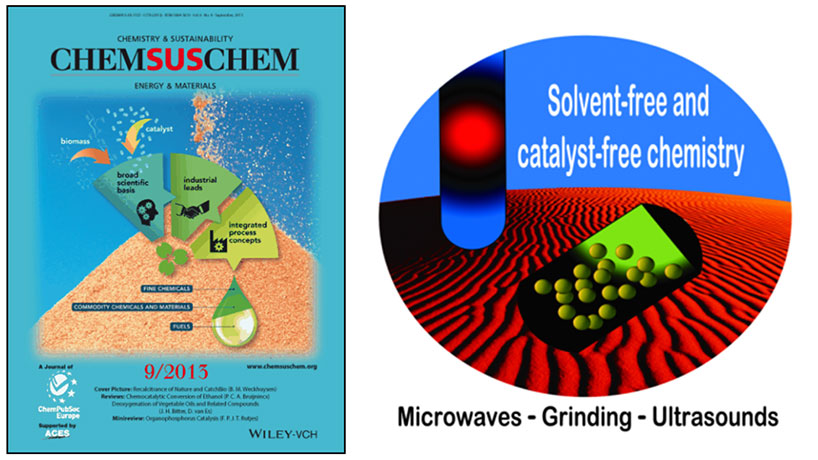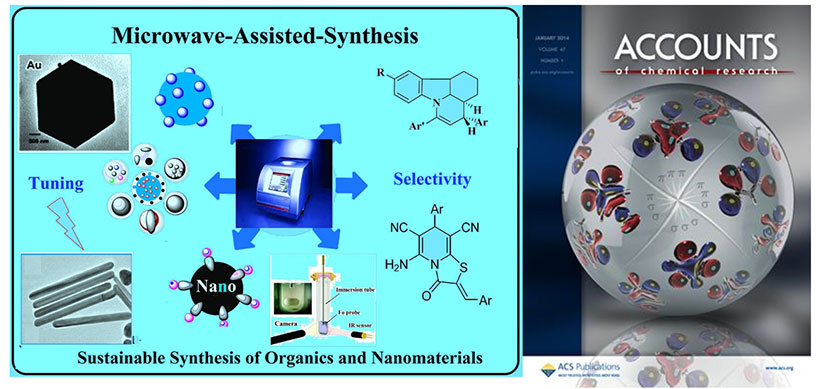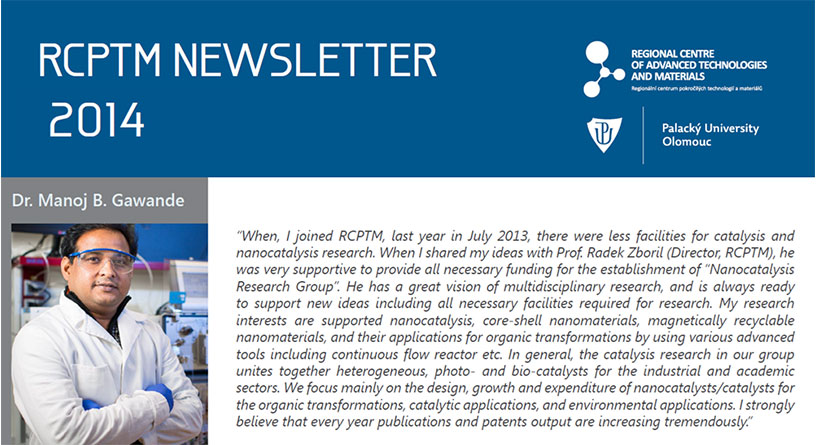Gawande et al. work on “Magnetic gold nanocatalyst (nanocat-Fe–Au): catalytic applications for the oxidative esterification and hydrogen transfer reactions” published in Green Chemistry, and highlighted in “Inside Front Cover” 2014.
30.05.2014
Nanocatalysis for sustainable organic transformations makes significant contributions in the area of pharmaceuticals as well as fine chemical industries and academia to develop novel chemical entities. In nanocatalysis, metal/metal oxide-supported catalysts, doped with noble metal (Pd, Pt, and Au) effectively utilized for selective organic methodologies and catalytic reactions. Gold metal/nanoparticles and supported-gold nanoparticles(NPs) also acquired a special place among noble metals due to their reactivity and employed for catalytic reactions. In addition to this Maghemite (γ-Fe2O3) also explored as a catalyst due to its abundance and benign properties. Considering the gold NPs and maghemite catalytic properties. The synthesis of maghemite supported gold nanocatalyst (nanocat-Fe–Au) and successfully catalytic activity demonstrated for oxidative esterification of aldehydes and the reduction of aromatic nitro compounds.
Green Chemistry, 2014, 16, 4137-4143. (IF- 9.12) “Inside Front cover”
Web: https://pubs.rsc.org/–/content/articlelanding/2014/gc/c4gc00774c/unauth#!divAbstract

Gawande et al. research article entitled “Solvent-free and Catalysts-free Chemistry: A Benign Pathway to Sustainability” published in ChemSusChem, also included in “Top 10 articles”, recommended by Reviewers, 2014
2014
Organic chemistry is a major and important discipline of chemistry because of its importance in fine chemicals, petrochemicals, and most importantly in drug discovery and pharmaceuticals. In this Review, the focus is on the Solvent-free and catalyst-free organic reactions under ambient and mild conditions are described. Synthetic organic protocols using greener and more efficient methodologies are crucial for the development of more sustainable processes.
ChemSusChem, 2014, 7, 24-44. (IF- 7.7) “Top 10 articles”, recommended by Reviewers
Web: https://chemistry-europe.onlinelibrary.wiley.com/doi/abs/10.1002/cssc.201300485

Gawande et al. research article entitled “Microwave-Assisted Chemistry: Synthetic Applications for Rapid Assembly of Nanomaterials and Organics” published in Accounts of Chemical Research, 2014
25.03.2014
The microwave (MW) heating technique, has emerged as a valuable alternative in the synthesis of organic compounds, polymers, inorganic materials, and nanomaterials. In this research article microwave-assisted synthesis highlighted the introduction of various prototypes of equipment, classes of organic reactions pursued using nanomaterials, and the synthesis of unique and multifunctional nanomaterials are described. The main aim of this article is the use of MW assisted techniques to develops the new design of synthetic protocols for organics and nanomaterials in future.
Account of Chemical Research, 2014, 47, 1338−1348. (IF= 21.66)

Dr. Manoj B. Gawande shared his views about RCPTM, which is Published in RCPTM Newsletter in the section "The Rising Generation of RCPTM" 2014.
2014
Dr. Manoj B. Gawande, Head Nanocatalysis Laboratory RCPTM is one of the rising generations in RCPTM expressed his views published in RCPTM Newsletter 2014. Every scientific centre grows due to the way it treats its future in its human resource policy. As the immortality pill has not yet been invented it is inevitable the best researchers will be one day forced to hand over the reins to the next generation.

Dr. Manoj B. Gawande has been awarded “Mahatma Gandhi Pravasi Samman” (MGPS) Congratulations……!!! ,
May-2014
Dr. Manoj B. Gawande was honoured with the “Mahatma Gandhi Pravasi Samman – 2014 by the Ministry of Overseas Indian Affairs, Government of India in conjunction with the NRI Welfare Society of India, for his outstanding contribution, service, and achievements in Chemistry Research.

